Parade
Alfred Uhry (Book); Jason Robert Brown (Music & Lyrics);
Hal Prince (Co-conceived); Daniel Felsenfeld (Orchestrations)
BroadwaySF
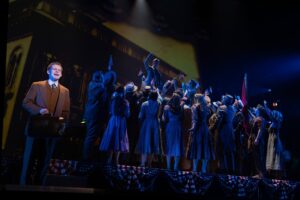
It is 1913 in Atlanta, not quite fifty years after the city lay in total ashes at the end of the Civil War. An annual, Memorial Day parade is in progress; but in this parade, there are no signs of American flags — only those of the defeated Confederacy. As old veterans hobble by to the roaring cheers of the crowd, voices rise in heart-pounding harmonies, “Praise those who’d fight, for the red hills of Georgia; for those proud and valiant men, we’ll sing “Dixie” once again.”
In this city where memories are still bitter, where revenge is palpably in the air, and where “Yankee” is a word spat out with much hate when said aloud, Alfred Uhry places his 1998 musical Parade with its rousing music by Jason Robert Brown that draws on a wide range of American styles. The true story Uhry’s book is an American tragedy of injustice toward a man deemed different and soon to be branded a devil with horns — a Yankee Jew named Leo Frank. The false narrative built to convict Frank of a young girl’s horrific rape and murder is one fueled by ambitious, amoral politicians; a headline-seeking, right-wing press; and a public prodded by both to seek supposed justice — vicious, societal elements still too currently familiar over one hundred years later.
After a 2023 Broadway revival when Parade won the Tony for Best Musical Revival, the touring show arrives at BroadwaySF’s Orpheum Theatre in a magnificent and monumental production that is eye-opening, heart-rendering, and all too timely — especially as antisemitism has hit an all-time high within the United States.
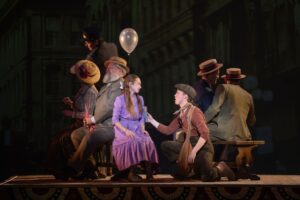 We first meet a young Mary Phagan (Olivia Goosman)– not quite thirteen — as she rides the trolley on this parade day Saturday with her friend, Frankie Epps (Jack Roden), who is playfully flirting and trying to convince her to go to the movies with him. Their brightly sung “The Picture Show” exudes in cuteness and innocence as Mary heads to the National Pencil Factory where she works for ten cents an hour to collect her weekly earnings of $1.20 from the superintendent, Mr. Frank.
We first meet a young Mary Phagan (Olivia Goosman)– not quite thirteen — as she rides the trolley on this parade day Saturday with her friend, Frankie Epps (Jack Roden), who is playfully flirting and trying to convince her to go to the movies with him. Their brightly sung “The Picture Show” exudes in cuteness and innocence as Mary heads to the National Pencil Factory where she works for ten cents an hour to collect her weekly earnings of $1.20 from the superintendent, Mr. Frank.
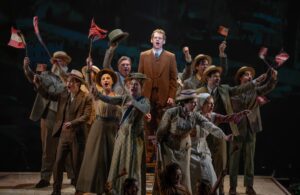
Leo Frank (Max Chernin) is a quiet, non-assuming man who sings his discomfort as a college-educated Jew from the North who now finds himself where “these people make me tense … these people make no sense” in “How Can I Call This Home.” His disquiet is compounded by a marriage to a woman, Lucille (Talia Suskauer), whom he wonders, “How could God have created a person both Jewish and Southern” — a wife whom he sings, “would prefer I said “Howdy,” not “Shalom.”
But nothing in this strange land with its slow-drawling populous can prepare Leo for that night’s midnight knock on the door and the news that a young girl’s dead body has been found at his factory — especially when he is taken in to be first interrogated and then to be accused of Mary Phagan’s murder.
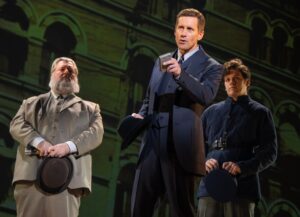
The insidious ingredients that lead to Leo’s arrest, eventual trial, and a trumped-up conviction are all too shockingly familiar. Hugh Dorsey is a prosecutor with a lousy conviction rate who is told in no uncertain terms by Georgia Governor Roan to find the murderer fast. Both are feeling the heat of mounting pressure from an aroused public who are mourning with soulfully sung “There Is a Fountain” and are growing in rage in tear-filled, body quivering notes of “It Don’t Make Sense.” Dorsey decides that his case needs someone to blame more than his usual target, a Black man. Andrew Samonsky sings in viperous-infused notes Dorsey’s invented accusation that “Somethin’ Ain’t Right” about Leo Frank: “He smells of it; he stinks of it.”
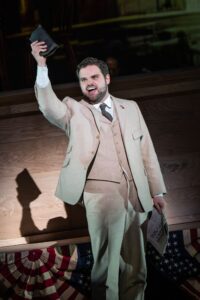
But Dorsey needs help, and he soon finds that in the publisher of the far-right The Jeffersonian, Tom Watson (Griffen Binnicker) who first sings in purposefully solicitous tenor, “Little Angel .. I will be here keeping you safe and pure” (“Lullaby”). Watson soon shows his true colors in romping, revival-style fever while pounding righteously his Bible while intoning, “I have come to Atlanta with a message from the Lord .. to see the devil get his just and true reward.”
To his and Dorsey’s aid comes an unscrupulous reporter, Britt Craig, who sings with mouth-dripping sleaze and yet Broadway Baby style “Real Big News,” announcing in triumphant style, “My savior has arrived … My career is revived.” In a toe-tapping, show-stopping, but much-disturbing number, Michael Tacconi’s Craig eggs on potential witnesses with his contagiously inducing “Go on, go on, go on” to create false accounts to give this “little Jew from Brooklyn” “fangs,” “horns,” and “scaly, hairy palms.”
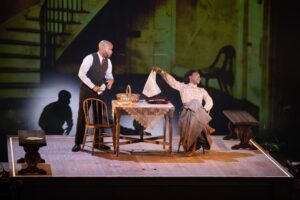
As all the sickening momentum builds toward inevitability of hate-manipulated injustice, what makes the awful history of Parade so magnetically compelling is the music that Jason Robert Brown has composed to ensure we understand that this is truly an American story. We are moved by the gospel ringing voices of a mourning congregation soon turning into the stomping anthem of a demanding mob. We hear the powerful aliveness of a Black couple (Prentiss E. Mouton and Oluchi Nwaokorie) singing “A Rumblin’ and a Rollin'”as they note that the growing national attention about this young white girl and white Jew is something that atrocities against people of their color never get. Songs smacking of jazz, those with Broadway bounce, and others foretelling a future of rock and folk further populate the impressive score.
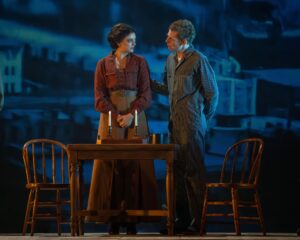
But it is in the development of Leo and Lucille’s relationship where some of the musical’s most moving and beautiful, American-style ballads of love are found. It takes separation while Leo spends a couple years in jail for their early marital distance from each other to bridge into a love that makes Leo’s eventual demise even more tragic. Max Chernin and Talia Suskauer’s duets of “This is Not Over Yet” and “All the Wasted Time” find their voices beautifully intwined and soaringly moving.
Musically, what really is powerful as well as disturbing about Brown’s score and lyrics is the recurring, stirring chords of “The Old Red Hills of Home.” Its pride-filled nostalgia for long-ago is embedded with an underlying longing for times that were full of racism and prejudice against anyone that is an outsider in race, creed, or religion — someone like Leo Frank. Like Cabaret‘s beautiful “Tomorrow Belongs to Me” sung by the young Nazi-in-the-making, Parade’s “The Old Red Hills of Home” leaves an enduring ear worm to remind us that the societal troubles of another century are still very much festering today.
That point is highlighted even more dramatically in the musical’s climatic moment of tragedy when Leo Frank chants Judaism’s most holy prayer, “The Shema” with a tune mixing the traditional chant with chords of the now-familiar “Red Hills” theme. As he in a final, holy moment is still trapped in the surrounding world of prejudice, so are we still today.
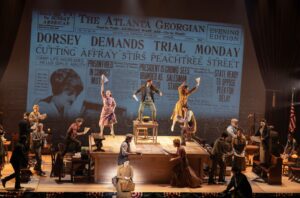
The staging of this touring version of Parade is grand in scope and nature. The large cast of over thirty mostly sit on stage the full time, assembled in church pews, factory tables, and court-room chairs (Dane Laffrey, set design) Centered and rising above them is a platform where much of the story’s core takes place, with all their eyes watching and ready to react. Behind, photographs of the actual people we meet, fiery and accusatory headlines from the newspapers of the times, and actual scenes most shocking and disturbing of the events playing out before us are projected as designed by Sven Ortel. Lighting designed by Heather Gilbert plays a dramatic role in inviting us and sometimes forcing us to focus on both the gestalt and the specific. The costumes of Susan Hilferty and Mark Koss impressively place us in the era and among the societal, economic, and political positions of the people involved.
The direction of Michael Arden is at times amplifying multiple, intertwining activities and at times focused on the minute nuance of individual mannerism. There is a sense being on the brink of over-whelm and also of being drawn to a transfixed state of freeze on one particular moment.
Much like the disturbing but musically soaring Ragtime and its tragic story of early twentieth-century racism, Parade is an all-American story that is now more important than ever for audiences to experience and to take home its messages of a society’s ongoing threat of racism, antisemitism, and injustice. But both musicals also leave audiences with the power there is in love and in faith that allows the possibility of hope even against a mountain of adversity. Hope is in fact the final message of this touring production of Parade at BroadwaySF’s Orpheum Theatre. We learn in the final seconds that justice for Leo Frank is still in the making as a 2019 reopening of his case is now in progress with a goal finally to declare him completely innocent. May it soon be so.
Rating: 5 E
A Theatre Eddys Best Bet Production
Parade continues through June 8, 2025 in a two-hour, thirty-minute production (one intermission) in a national touring production hosted by BroadwaySF at the Orpheum Theatre, 1192 Market Street, San Francisco. Tickets are available at https://www.broadwaysf.com/.
Photo Credits: Joan Marcus

Leave a Reply